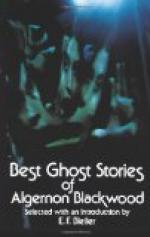Their work, when performed in the night, requires more than ordinary nerve, inasmuch as the interior of the great structure is literally alive with echoes and other suggestions of the supernatural. In the daytime, when the place is full of people and the noises of busy life, the professional guides make a point of showing persons how a whisper uttered when standing on a certain marble block is distinctly audible at another point quite a distance away, though unheard in the space between.
A good many phenomena of this kind are observable in various parts of the Capitol, and the extent to which they become augmented in strangeness during the silence of the night may well be conceived. The silence of any ordinary house is oppressive sometimes to the least superstitious individual. There are unaccountable noises, and a weird and eerie sort of feeling comes over him, distracting him perhaps from the perusal of his book. He finds himself indulging in a vague sense of alarm, though he cannot imagine any cause for it.
Such suggestions of the supernatural are magnified a thousand fold in the Capitol, when the watchman pursues his lonely beat through the great corridors whose immense spaces impress him with a sense of solitariness, while the shadows thrown by his lantern gather into strange and menacing forms.
One of the most curious and alarming of the audible phenomena observable in the Capitol, so all the watchmen say, is a ghostly footstep that seems to follow anybody who crosses Statuary Hall at night. It was in this hall, then the chamber of the House of Representatives, that John Quincy Adams died—at a spot indicated now by a brass tablet set in a stone slab, where stood his desk. Whether or not it is his ghost that pursues is a question open to dispute, though it is to be hoped that the venerable ex-President rests more quietly in his grave. At all events, the performance is unpleasant, and even gruesome for him who walks across that historic floor, while the white marble statues of dead statesmen placed around the walls seem to point at him with outstretched arms derisively. Like the man in Coleridge’s famous lines he
“—walks
in fear and dread,
Because he knows a frightful fiend doth
close behind him tread.”
At all events he is uncertain lest such may be the case. And, of course, the duties of the watchman oblige him, when so assigned, to patrol the basement of the building, where all sorts of hobgoblins lie in wait.
One of the Capitol policemen was almost frightened out of his wits one night when a pair of flaming eyes looked out at him from the vaults under the chamber of the House of Representatives where the wood is stored for the fires. It was subsequently ascertained that the eyes in question were those of a fox, which, being chevied through the town, had sought refuge in the cellar of the edifice occupied by the national Legislature. The animal was killed for the reason which obliges a white man to slay any innocent beast that comes under his power.




